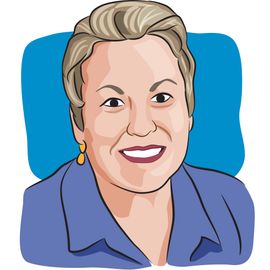- About Us
- Advertise / Support
- Editorial Board
- Contact Us
- CancerNetwork.com
- TargetedOnc.com
- OncLive.com
- OncNursingNews.com
- Terms & Conditions
- Privacy
- Do Not Sell My Information
- Washington My Health My Data
© 2025 MJH Life Sciences™ and CURE - Oncology & Cancer News for Patients & Caregivers. All rights reserved.
Lives Well Lived: Looking Back

Kathy LaTour is a breast cancer survivor, author of The Breast Cancer Companion and co-founder of CURE magazine. While cancer did not take her life, she has given it willingly to educate, empower and enlighten the newly diagnosed and those who care for them.
CURE honors those who lost their lives to cancer.
We would be remiss to celebrate CURE’s first decade and all the treatment advances it has brought without also honoring the friends we’ve lost. During the past 10 years, we have seen progress not only in many aspects of treatment but also in controlling side effects and help for psychosocial support. Survivorship has become its own distinct part of the cancer journey, and metastatic cancer no longer means the immediate death sentence it once did.
But we also know that with more than 1,500 Americans dying daily of cancer, there is still much work to be done. The people you have met in the pages of CURE have helped the newly diagnosed with myriad aspects of the cancer journey, including diagnosis, getting good care, making the right treatment decisions and even how to die.
And yet some of the stories did not end well—many people we profiled did not live out the decade because cancer took them before their time. Cancer’s story is best told not by test tubes and clinical trials but by lives lived and lives lost. Just as we celebrate those who lived, we want to remember those we lost through the lives of three people who touched our hearts.
We introduced Dallas Judge Karen Greene in an article about vaccines. I met Karen at our local Gilda’s Club, now called Cancer Support Community, where we facilitated a support group on spirituality, and when CURE needed a patient voice for someone who had chosen to participate in a vaccine trial, I thought of Karen.
Karen received a diagnosis of stage 3 breast cancer in 1999 and outlived the oncologist’s dire prediction that she would be dead in two years. She learned about a phase 1 clinical trial for a vaccine that was being offered at Memorial Sloan-Kettering Cancer Center in New York City, and she signed up despite the fact that it required 12 trips to New York City for shots to build antibodies against a recurrence.
The trial did not pay for her transportation or her doctor’s visits, which she paid for herself, feeling, she told me, privileged to take part in something that might help other women. In late 2006, Karen began experiencing pain in her left arm, which turned out to be a recurrence. She died in April 2007, but not before living seven years past diagnosis, during which time she married for the first time and bought and renovated her first home.
One of the moments we treasure at CURE occurs when we present the annual Extraordinary Healer Award to an outstanding oncology nurse who has gone above and beyond for a patient. The 2009 winning essay was written by Renée La Forest, who nominated Christine Wilson, RN, a pediatric nurse at Nationwide Children’s Hospital in Columbus, Ohio, who had cared for La Forest’s daughter, Delaney Diggs, when she was diagnosed with Ewing’s sarcoma of the skull at age 6 in 2002.
La Forest wrote elegantly of Delaney’s battle, and Delaney joined her mother at the CURE reception, where more than 800 nurses gathered. When La Forest stepped to the platform to read her essay, no one knew that Delaney was waiting in the wings, so they feared the worst—that Delaney had died. But then the spritely 13-year-old joined her mother onstage, and the sense of relief among the nurses was palpable. Delaney had not been lost. We left with such hope that this time cancer had lost. But it was not to be.
In mid-2010, after seven years of remission, Delaney learned she had a radiation-induced peripheral nerve sheath tumor. The family, including her brother and sister, geared up for a second fight, but it was soon clear that this time the cancer would win. Shortly after her 15th birthday in March 2011 and her much anticipated quinceañera, Delaney, who loved butterflies, was awarded her wings.
In 2008, a very special lung cancer patient named Judy Abernathy decided she wanted us to tell her story. Her story was different because she knew she was dying, and as she told us, if her personal account helped one person, then it was worth it. Judy was transitioning to hospice care when we met, living as the central figure in her daughter’s family where her grandchildren received hours of her love and attention. During her final months, as we talked, we also chronicled, in photographs, important moments as she said goodbye to her family and made peace with her former husband, the father of her children. CURE was there for the final acts: teaching her grandsons to cook a favorite recipe, welcoming the first great-grandchild into the family and regretting a decision to smoke early in her life. On the last afternoon of her life, Judy’s daughter, Christy, sat with her mother, holding her hand and watching her mother’s lips move in conversation. “She is talking to someone who is coming for her,” Christy said. Judy died at home early the next morning, Oct. 18, 2008, at age 65.
Related Content:



